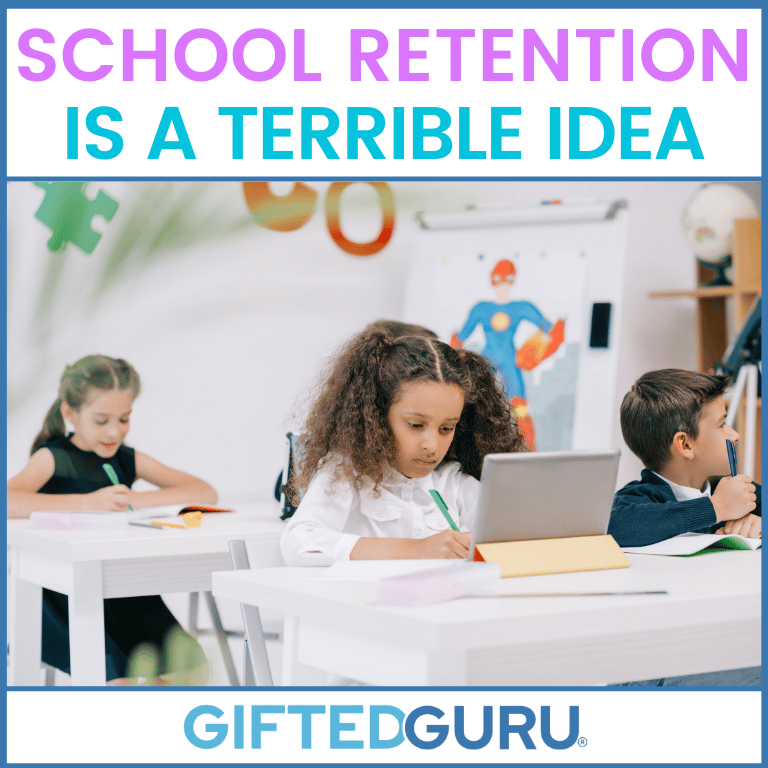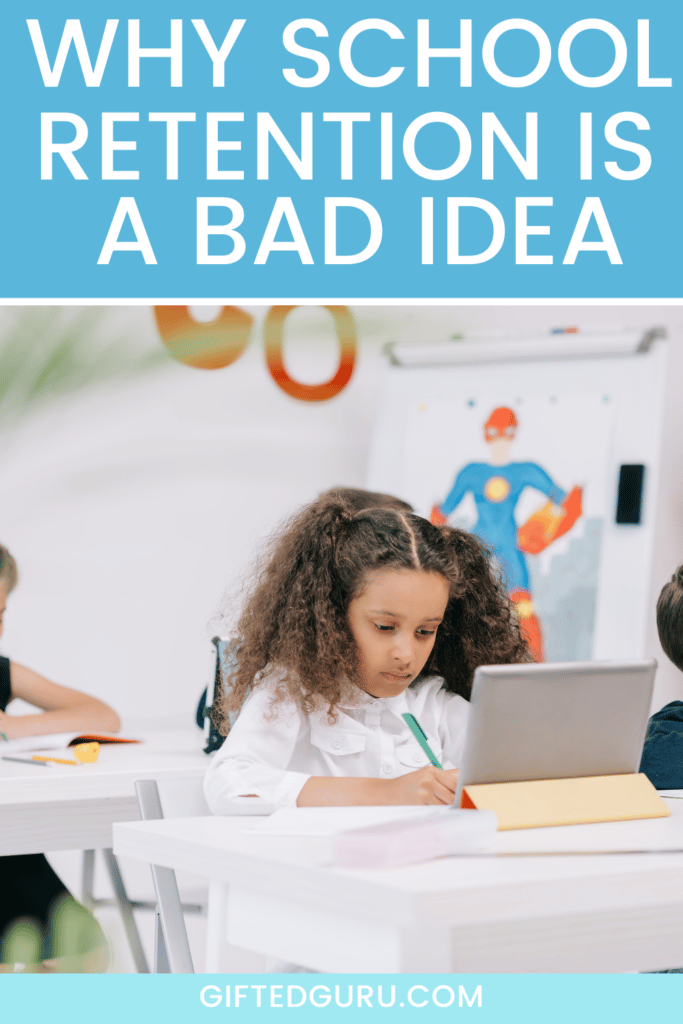
Here’s a question I would never have thought you’d hear me say: Is school retention a good idea for gifted kids?
Recently, I’ve received emails from multiple teachers pleading for help in persuading parents not to redshirt or retain their gifted children. When I read the first one, I literally laughed out loud. Was this an April Fool’s joke?
Unfortunately not.
I’ve also received emails from parents being pressured to allow their children to be retained.
The emails from parents and teachers kept coming, and I decided to confront this issue publicly in the hopes of saving children from a disastrous decision made by adults.
Even though I am specifically addressing retention vis-à-vis gifted students, the general arguments apply to all students.
WHAT IS RETENTION?
When we talk about retention, we mean that a child who has spent a full school year in a particular grade must repeat the entire grade just completed.
Redshirting is where we hold a child back a year, delaying school entry. Primarily, redshirting has been for athletics and recruiting, not academics.
Parents and teachers are asking for research on the effect of this on gifted kids that they can share.
Here’s why: they already know this is a very, very bad idea, and they’re desperate to save their students from a truly devastating error on the part of whoever it is who is pushing for retention.
If you’re a parent considering this or if are a teacher who thinks it’s a fine option, let me explain why this is a terrible, horrible, no good, very bad idea.

RESEARCH INTO RETENTION
Let’s get the research out on the table first. There has been a lot of research done on retention, and it is almost universally negative. If you’re looking for a dissertation topic, I wouldn’t pick this because it’s been beaten to death and everyone knows the answer already: It doesn’t work, and it doesn’t help, especially long-term, and especially with older children.
In a study published in 2019 in the Journal of Research on Educational Effectiveness, the researchers concluded that retention had a “long term detrimental effect on reading achievement” (Hwang & Capella, 2019).
But it’s not just reading.
In a study published ten years earlier in Educational Evaluation and Policy Analysis the researchers found that, “first grade retention shows negative effects that stay almost constant from 1 year after treatment to 3 years later. In general, we find no evidence that early-grade retention brings benefits to the retainees’ reading and math learning toward the end of the elementary years” (Hong & Yu, 2007).
A longitudinal study published in School Psychology Quarterly that is frequently cited in other studies found what nearly every study on the subject finds.
Here’s what the researchers wrote: “Results of this study failed to demonstrate the effectiveness of grade retention on academic achievement. Moreover, analyses of behavior suggest that retained students display more aggression during adolescence. Furthermore, the group of students recommended for transitional placement, but promoted, were comparable to the control group on all achievement and behavior measures during high school” (Jimerson & Ferguson, 2007).
It doesn’t even help the kids who it could be argued may have needed it academically.
This study found that retention was a greater predictor of later school dropout rates than academic performance.
The research on underachievement in gifted children indicates that inappropriate academic experience and placement or dissatisfaction with their educational experience leads them to dropout at much higher rates. Consider that for a moment. You could be making a decision now that could lead to your child’s dropping out later.
Even the very few studies that found any benefit of grade retention looked only at early elementary retention and in the short term. The long-term negative consequences overrode and overshadowed that benefit.
In a Swiss study, the researchers concluded, “Grade retention should be avoided at the primary school level” (Bonvin, Bless & Schuepbach, 2008).
I could find no studies specifically on retention of gifted children, and you know why? It’s academically indefensible. The deleterious effects of retention, both academically and psycho-socially on a gifted child could be so great that it would be difficult to conduct the study.
HOW RETENTION HARMS CHILDREN
There’s no academic benefit to retention, but there is plenty of possibility for harm. In addition to the consequences described in the research above, consider these consequences:
- Social: The student is losing their peers in very different way than when a student is accelerated. They are being left behind and will have to explain why. While explaining acceleration is easily done with the simple statement, “They figured out that this is the grade I was supposed to be in,” even very young children understand that repeating the same grade is not desirable.
- Emotional: Boredom is one of the greatest threats to emotional health of gifted children. That problem is greatly exacerbated by repeating the same content again, even in children who did not perform well the first time. Humans do not, as a rule, enjoy repetition. There is a cost here.
- Economic: It’s difficult to calculate the economic cost of retention. We know the average cost to a school district is about $13,000 per year. I find it hard to see how a parent of a child could persuade an elderly couple paying taxes in their school district that it’s worth thirteen grand to make sure their child has an advantage in sports. That’s a level of selfishness that’s impossible to defend.
- Economic: Another economic issue is the delay of the child into the workforce. A student who is retained will enter the workforce a year later. While we can’t know what a child’s salary will be, let’s use the amount $60k. Even if none of that money were invested, and even if we didn’t calculate the impact on retirement or vesting in a company’s retirement plan, we’re faced with a significant reduction in life-long earnings.
CASE STUDY ON RETENTION
While every story about retention or redshirting is different, it can be helpful to read about a real-life example. I’m going to share with you an actual example of one family’s experience.
A Meeting to Discuss Retention is Requested
After I discussed retention in a video on YouTube, I received this email from a parent who had watched the video:
First I’d like to say my child is amazing but not ‘gifted’ so I hope you are still able to help me.
My husband and I early enrolled my son into kindergarten because his birthday is August 27th and the cut off date for kindergarten is August 1st. We thought we did the right thing so he would be with his peers. He is small by nature, he takes after his parents so even if we ‘redshirted’ him he would still be one of the smaller students in his grade.
With that said he is doing very well in kindergarten now that we know he was struggling. In February his teacher showed me charts of where he was not improving in ‘nonsensical words’ and ‘decoding’. Since that meeting my husband has gone above and beyond with our son. I am proud of both of them. Our son is reading small sentences like ‘Kit’s mom gets dad up. Kit’s mom gets Kit up.” “Min can run.” “I see a big blue bus and a little yellow bird.” He is able to sound out the letters but has trouble now and then with the long vowels.
We have a meeting tomorrow with his teacher for ‘possible retention’. She is not telling me beforehand if he is progressing or not even though I have straight out asked her to stop being so cryptic.
From what I can gather based on his report card and speaking with his phonics teacher, he has the ability to learn and he is smart but he is not focused and is ‘immature’. I DO NOT agree with retaining him based on him being an active – normal – 5 year old boy.
I want what is best for my child and even though the research is few and far between I have done my homework before finding your video (which is awesome! Thank you for posting it). The common consensus is NO! Retention is good for maybe the first few years but the long lasting effects are scary! High school dropouts, low self esteem, boredom in school leading to misbehaving.
In your video you mentioned getting and reading emails hence mine…Can you please tell me based on the little information I just gave you if this stands out as a case that needs retention? You are so qualified! I want to do everything in my power to research this topic. I have my questions, notes and works cited I made for the meeting, and a response from you would be the cherry on top.
Thank you for your time and consideration about my son.
Asking Clarifying Questions
When I received this email, I knew I needed more information. I wrote back:
- I’d need more information. Has he been evaluated for any kind of language processing issue?
- It’s not time for retention discussion yet. Not giving you information about issues until February is not sufficient to make this decision.
- There are other skills in Kinder. How is he doing with math and other content?
Answers to the Clarifying Questions:
The parent responded (my questions are in italics):
Has he been evaluated for any kind of language processing issue?
From what I know all evaluations are good, no problems that I am aware of.
Not giving you information about issues until February is not sufficient to make this decision.
And I feel like we have wasted time all year by not knowing sooner!
How is he doing with math and other content?
To our surprise they are learning addition and subtraction – found out on the report card. So he has a low score in that, but I know if we start working with him he will get it. He is a numbers guy.
I have attached his report card; we got it Friday. What is strange is that his immaturity is being presented as a reason for this retention, but if you look at his ‘Learning Skills/Behavior’ he is doing wonderfully! Like an A student! I may not be a numbers girl but this doesn’t add up.
Lisa’s Note: I am not going to share the report card for privacy reasons, but I read it and was not persuaded. While I don’t know this student, I am a certified and experienced teacher and administrator.
One issue we have to confront is that we cannot keep making grade-level standards inappropriate and then retaining students when they don’t master them. We have made Kindergarten what second grade used to be. This is a problem.
The Retention Meeting
The parent and I emailed back and forth a couple of times before the meeting. The parent was worried that they should have redshirted him (more on that in the section on redshirting).
I was assuring the parent that they were doing a great job. You know, most parents are just hoping they’re doing a good job.
Parents, you’re most likely doing a great job! If no one has told you that, let me be that person.
After the meeting, I received this email:
Our meeting Friday left us overwhelmed to say the least.
In a nutshell – our August 27th baby is the youngest in his class/grade. Due to COVID, his grade is full of old 6 and 7 year olds (In December we noticed artwork from kids in his class aged 6 and 7 but did think too much into it, but now it’s all coming together). COVID made parents hold their kids back from entering Kindergarten ‘on time’ due to many reasons. The 2021-2022 kindergarten grade now has a large group of older 7 year olds whom my young 5 year old is competing with. So while my son is smart and knows his spelling, writing, and math as well as a 5 year old can, he is very distracted and immature – he is just not interested in what is happening in school.
Now I know this is not due to him being around older kids but if he were in a class with peers closer to his age would that matter? Or would they all be in the same boat so to speak? I guess we will never know at this point.
As far as his individual journey, the reason we found out in February is because the school needed 2 quarters of testing to compare. Both quarters are not showing the progress they want to see. We met with the principal, the guidance counselor, and the kindergarten teacher, all who agree he is smart without any learning disabilities, just immature and unfocused. They fear if we push him into first grade at this level he will really struggle, shut down, and regress. So we are working together as a big team to make sure we utilize all of April, May and June (Summer School) to see if we could bring his grades up. June is our deadline for retention or progression decision making.
As his mother I am even more confused now than before! Going forward, even if he does well and can handle 1st grade, do I want him in a 1st grade class with kids who will be closer to 9 than 6? (He will have just turned 6 days before 1st grade starts) And in high school we have to think about puberty and driver’s license…He will be behind his grade and it will physically be noticable. Now I am thinking – Do we hold him back just to be with kids he can actually compete with, because honestly there is a big gap between certain ages later in school outside of academics?
From what the principal told us, the 2nd grade class of 2021-2022, dubbed the ‘Pandemic Babies’ are struggling so badly with the effects of remote learning and all COVID has thrown at them that their retention rate this year is very high. Poor kids!
I never thought COVID would affect my son’s school career like this!
Did we screw him up thinking “Hey, he will be 5 years old 3 days before kindergarten starts, let’s fight to get him in with his “peers” not knowing his actual peers won’t start until the 2022-2023 school year due to redshirting!!”?
So there is my update…my crazy mom version of it. Thanks again for your shoulder to lean on. It opened my eyes and removed my rose colored glasses 😎
Who Benefits from Retention?
After this, a series of short emails were exchanged where I was asking questions like:
Do you think he would be happy doing this exact same work all over again next year?
The parent wrote back:
No, he’s catching on. And he has stated many times hes ready for 1st grade. He actually said he wants the 1st grade rules. Strange coming from the boy who hates the rules in iur house 😆
Since school started he has learned to read, write, and do math. I think its amazing! The group we had a meeting with seemed to really push this, and that’s the scary part. As if 1st grade is so much more advanced than Kindergarten, and he is destined to fail.
What the heck are they learning in first grade!?! Trigonometry and college essays!? 👨🎓
I couldn’t help but hone in on the child’s desire for “first grade rules.” I see this so often in gifted kids: they crave structure at school, even while rebelling against it at home. Note to teachers: a well-structured classroom helps all students. It does not inhibit creativity.
I reminded the parent of this truth: They’re more concerned about them than him. They care about their numbers, their stats. There’s nothing wrong with that…until there is.
It’s not the school’s fault they’re so worried about scores. That’s pressure that rolls downhill to them (and lands on them like an enormous rock slide).
This pressure is why so many students are guided into retention.
Did They Decide to Retain?
I encouraged her to hold firm. Several months later, I received this email:
I want to inform you of the end results of my son’s adventures in kindergarten and summer school since I roped you into the story back in April. His grades climbed up and are at the goal scores or higher. He will start 1st grade in August! 2 days after he turns 6!
Was I surprised? Not at all.
What is sad is that had this child not had a parent who happened to see my initial video and reach out for support, this child would most likely have been retained. It’s very difficult to stand alone as a parent against a room full of professionals telling you what they think is best for your child.
If you need support, be sure to check out the video about this topic, and join in the free livestreams I do. Join the Insiders to know when those are coming.
SHOULD YOU EVER RETAIN A GIFTED STUDENT?
As someone widely considered an expert in gifted education, I can say without hesitation or equivocation that I would never, ever, under any circumstances other than the most dire, such as severe trauma, retain a cognitively gifted child. I can see no benefit to it, either from the vast body of research nor my extensive professional experience.
The child is at extreme risk of pathological boredom, and studies have shown that pathological boredom is just that: pathological. It even impacts physical health. In a study published in the journal Experimental Brain Research, the researchers found that individuals with high boredom proneness were more likely to have ADHD and depression. (Malkovsky, Merrifield, Goldberg, et al., 2012)
No studies have been done to see if this happens when we retain a mentally healthy child and induce boredom through school retention. Frankly, I see no way this could pass a review board. Can you imagine a researcher saying, “We want to take mentally healthy kids and try to create mental illness by inducing significant boredom.” Yeah, I don’t see that being approved any time soon.
If there is a concern about a learning disability, retention is not nearly as effective as appropriate intervention. Retention is a get-out-of-good-intervention play, not an effective strategy.
According to reports from teachers, often the intent is to give students an advantage in athletics, rather than for any academic purpose. That’s pretty obvious because there really could be no academic purpose. Messing with grade levels for athletics is more commonly done through delayed school entry, rather than repetition, so let’s move onto that topic.
REDSHIRTING
I blame Malcolm. In his 2008 book Outliers, Malcolm Gladwell argues that a person’s age relative to his or her grade-level peers is a key predictor of success. So, the older you are relative to others in your grade or league, the more likely you are to do better than they do.
Well, just like his 10,000 hour rule, this is a little more nuanced. The study he cited for academic superiority doesn’t really play out long-term. What we find is that younger kids have a steeper learning acquisition path, and they catch up pretty quickly.
Even with sports, as this practice becomes more common, leagues are more likely to be age-framed, rather than by grade.
In a long-term study done on delaying school entry, the authors concluded, “The results of this study suggest that delaying kindergarten does not create any long-term advantages for students” (Lincove & Painter, 2006).
There’s an equity issue here, too. A study published in Educational Evaluation and Policy Analysis found that redshirting was very much aligned with race, gender, and wealth. “Male, White, and high-SES children are most likely to delay kindergarten, and schools serving larger proportions of White and high-income children have far higher rates of delayed entry” (Bassock & Reardon, 2015).
As retained students move through the grades, the benefit of being older declines. Consider the ratio of advantage. In a Kindergartner, being a year older is vastly different as a percentage of time alive than it is when someone is fifteen or sixteen. By then, other factors such as genetics, opportunities, and home environment will play a greater role than simply time spent on the planet.
There are negative consequences to redshirting as well. In a study published in the American Educational Research Journal, researchers found that, “Redshirts and retainees are more likely to receive special education services than their peers who enter and are promoted on time.”
If you think that won’t happen to your child, consider that giftedness can be associated with all but two special education service qualifications. You can be gifted and also need special education services.
The study’s authors concluded, “Given its lack of empirical efficacy, we do not support widespread use of this strategy for increasing readiness” (Graue & DiPerna, 2000).
In layman’s terms, the researchers are saying that there is no scientific evidence to show that this is good for kids in the long term.
Delayed School Entry for Readiness
But what about parents who delay their children’s entry because they think the child isn’t ready for school?
In the case of gifted children, this is rarely an academic concern. The concern is almost always behavioral. One difficulty with this is that we have to make this decision in the spring, and the child still has months of development until school starts.
We also cannot predict at what rate the child will gain the skills we think they may be lacking.
Gifted children are famous (or perhaps infamous) for their asynchronous development. They are often advanced in one or more areas, and simultaneously delayed or on-level in others. Keep in mind that they may appear delayed socially or emotionally because we’re comparing them to their mental age. They think like they’re ten instead of seven, so we expect them to behave as if they’re ten instead of seven. I cry foul.
Yes, we may wish they could sit still longer, listen more carefully, or share better. But that is true of us as adults as well, and often these issues have less to do with a child’s immaturity than they do with a developmentally inappropriate expectation that a five-year-old sit in a desk all day.
Additionally, some of these things are part of a child’s personality, and they will not disappear after a year (or even thirty).
We do not punish children for undesirable social traits by refusing to meet their cognitive needs. At least, we shouldn’t.
Final Thoughts about Retention and Redshirting
Our children are not our avatars. We do not live vicariously through them, and we should never put our own desires to see them achieve what we wish we would have achieved lead us to make decisions that do not benefit them.
In the case of retention and redshirting, this is a decision that could do a tremendous amount of harm. And to what end?
Rather than retaining or delaying, a robust body of research exists that demonstrates the positive benefit of acceleration for gifted children. (Visit the Acceleration Institute for more on that.)
Parents, I plead with you as a fellow parent, an educator, and a grown-up gifted kid, please, please do not do this to your child. Please. You cannot foresee the harm this could cause, and you could end up with a child full of resentment towards you forever.
Teachers, as a fellow educator, I would ask you to please learn more about this issue. Please carefully consider what other (better) options exist.
There is little in education or parenting that is 100% sure, but this is one of those few things we know: this is a very, very bad idea.
The only kind of retention gifted students should be experiencing is retention of knowledge, and retention of memories of appropriate school placement done in their best interests.
Studies Cited
Bassok D, Reardon SF. “Academic Redshirting” in Kindergarten: Prevalence, Patterns, and Implications. Educational Evaluation and Policy Analysis. 2013;35(3):283-297. doi:10.3102/0162373713482764
Bonvin, P, Bless, G. Bless & Schuepbach, M. (2008) Grade retention: decision-making and effects on learning as well as social and emotional development, School Effectiveness and School Improvement, 19:1, 1-19, DOI: 10.1080/09243450701856499
Cascio, Elizabeth & Schanzenbach, Diane. (2007). First in the Class? Age and the Education Production Function. NBER Working Paper No. 13663. National Bureau of Economic Research.
Elder, T. E., & Lubotsky, D. H. (2009). Kindergarten entrance age and children’s achievement: Impacts of state policies, family background, and peers. The Journal of Human Resources, 44(3), 641-683
Hong G, Yu B. Early-Grade Retention and Children’s Reading and Math Learning in Elementary Years. Educational Evaluation and Policy Analysis. 2007;29(4):239-261. doi:10.3102/0162373707309073
Hwang, S. & Cappella, E. (2018) Rethinking Early Elementary Grade Retention: Examining Long-Term Academic and Psychosocial Outcomes, Journal of Research on Educational Effectiveness, 11:4, 559-587, DOI: 10.1080/19345747.2018.1496500
Graue ME, DiPerna J. Redshirting and Early Retention: Who Gets the “Gift of Time” and What Are Its Outcomes? American Educational Research Journal. 2000;37(2):509-534. doi:10.3102/00028312037002509
Jimerson, Shane & Ferguson, Phillip. (2007). A longitudinal study of grade retention: Academic and behavioral outcomes of retained students through adolescence. School Psychology Quarterly. 22. 314-339. 10.1037/1045-3830.22.3.314.
Lincove JA, Painter G. Does the Age That Children Start Kindergarten Matter? Evidence of Long-Term Educational and Social Outcomes. Educational Evaluation and Policy Analysis. 2006;28(2):153-179. doi:10.3102/01623737028002153
Malkovsky, E., Merrifield, C., Goldberg, Y. et al. Exploring the relationship between boredom and sustained attention. Experimental Brain Research 221, 59–67 (2012). https://doi.org/10.1007/s00221-012-3147-z
Rubenstein, L.D., Siegle, D., REIS, S.M., Mccoach, D.B. and Burton, M.G. (2012), A Complex quest: The development and research of underachievement interventions for gifted students. Psychol. Schs., 49: 678-694. https://doi.org/10.1002/pits.21620
Schanzenbach, Diane Whitmore, and Stephanie Howard Larson. “Is your child ready for kindergarten? ‘redshirting’ may do more harm than good.” Education Next, vol. 17, no. 3, 2017, p. 18+.
Wu, W., West, S. G., & Hughes, J. N. (2010). Effect of grade retention in first grade on psychosocial outcomes. Journal of Educational Psychology, 102(1), 135–152. https://doi.org/10.1037/a0016664









